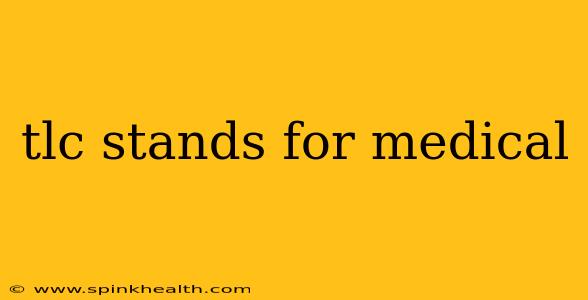TLC in the Medical World: Tender Loving Care and Beyond
The acronym TLC, often associated with warmth and affection, holds a significant, albeit often unspoken, place in the medical field. While not a formal medical term with a rigidly defined meaning, it's widely understood to represent tender loving care. But the reality of TLC in a medical context is far richer and more nuanced than a simple definition might suggest. Let's delve into what it truly encompasses.
My journey into understanding TLC in medicine began with a personal experience. My grandmother, facing her final days, received what her doctors referred to as "TLC." It wasn't just about the medication and procedures; it was the gentle hand that adjusted her pillows, the calming voice that read to her, the empathetic ear that listened to her anxieties. This human touch, often overlooked amidst complex medical treatments, was arguably the most vital aspect of her care.
This experience highlighted that TLC extends far beyond simply providing comfort. It's a holistic approach, intertwining several crucial elements:
What exactly does TLC encompass in medical care?
This question lies at the heart of understanding TLC's role. It's not just about being nice; it's a multifaceted approach.
-
Emotional Support: Patients facing illness often experience fear, anxiety, and depression. TLC includes actively listening to their concerns, validating their emotions, and offering reassurance and hope. This goes beyond the clinical interaction and fosters a therapeutic relationship built on trust and understanding.
-
Physical Comfort: This is the most readily apparent aspect of TLC. It involves ensuring the patient is physically comfortable—managing pain, providing assistance with mobility, adjusting bedding, and attending to personal hygiene needs. Simple acts of kindness can significantly improve a patient’s overall well-being.
-
Personalized Care: One-size-fits-all approaches rarely work in medicine. TLC means tailoring care to the individual patient's needs, preferences, and cultural background. This might include accommodating dietary restrictions, respecting religious beliefs, or simply understanding their communication style.
-
Family Involvement: Supporting the patient's loved ones is an integral part of providing TLC. Open communication, emotional support, and information sharing can significantly reduce stress and anxiety for both the patient and their family.
Is TLC a formal medical term?
No, TLC isn't a formal medical term like "intravenous" or "electrocardiogram." It's more of an understood concept, a philosophy of care that underscores the importance of the human element in medicine. While it may not appear in medical charts, its impact is undeniable.
How does TLC improve patient outcomes?
Research consistently demonstrates the powerful connection between TLC and improved patient outcomes. Studies show that patients who receive ample TLC often experience:
- Reduced anxiety and depression
- Improved pain management
- Faster recovery times
- Increased patient satisfaction
- Better adherence to treatment plans
How important is TLC in healthcare?
TLC is absolutely vital in healthcare. While advanced medical technologies and procedures are crucial, they are most effective when complemented by a compassionate and personalized approach that considers the patient's whole being – physical, emotional, and spiritual. TLC is not a supplementary element; it's an integral component of high-quality medical care. It reflects a fundamental commitment to patient well-being that goes beyond the technical aspects of treatment. In essence, TLC is the heart of good healthcare.
In conclusion, while TLC might not have a formal medical definition, its significance is profound and undeniable. It's the human touch that transforms medical care from a sterile procedure into a healing experience. It's the embodiment of compassion and empathy that makes all the difference in a patient's journey towards health and well-being.

